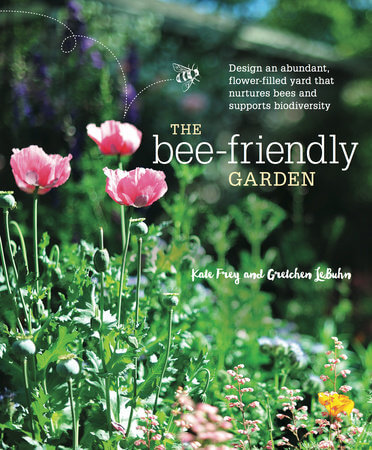I received this book for free from the publisher in exchange for an honest review. This does not affect my opinion of the book or the content of my review.
 The Bee-Friendly Garden: Designing a Beautiful, Flower-Filled Landscape for the World's Most Prolific Pollinator by Gretchen LeBuhn, Kate Frey
The Bee-Friendly Garden: Designing a Beautiful, Flower-Filled Landscape for the World's Most Prolific Pollinator by Gretchen LeBuhn, Kate FreyPublished by Ten Speed Press on 9 February, 2016
Genre: Gardening, Graphic novels, Non-fiction
# pages: 224
Source: Publisher
Goodreads
Rating: ★★★★
For every gardener who cares about the planet, this guide to designing a bee garden helps you create a stunningly colorful, vibrant, healthy habitat that attracts both honeybees and native bees.
I’ve been nursing this book for longer than I probably should have, but it’s so beautiful I just focus on the photos alone sometimes.
In a world where pesticides are the easy solution to most garden- and farm-related problems, The Bee-Friendly Garden provides natural alternatives to pesticides. Bees, though scary upon first impression, are actually better for the environment.
I fell in love with them. I used to love bees. I even registered a domain with “bee” in the name at one point, during my domain addiction years. But then I moved to the city, and city bees somehow became something I feared. They became just another pest I wanted gone. On the farm, they occupied similar space as monarch butterflies on the hummingbird feeders, or leased peaceful residence on milkweeds and dandelions. In the city, though, where there aren’t many plants for them to benefit by harvesting pollen from, I slowly started to fear them. I saw them less, I guess. No longer were the bees a part of my day-to-day interactions.
But this book made me fall in love with them. It helped me realise the world needs bees to survive. Bee Movie received flak from some people in my life during its promotional season, then a few years after its release. “It’s melodramatic,” they said. “The world would go on if there were less bees.”
But not every bee harvests pollen or makes honey. Not every bee stings. Some bees deter actual unwanted pests. Some bees help your produce garden plants, like tomatoes, grow to be the best they can.
The Bee-Friendly Garden has the potential to remind society today how important the Earth is—that all living things share it, and we need to work together to keep it spinning. Bees are an integral part of humanity, after all.
I think the only thing this book lacked was an actual list—like a guide of sorts—containing all the plants poisonous to bees, then a list of plants with the types of bees they attracted. Of course, such a list would likely stretch far and wide…and I may just be looking for an easy way to understand something I’m not 100 percent familiar with.
Love this post?
Support me by subscribing to my blog and/or buying me a cuppa:
Comments on this post
Nancy
Bees are good for the society! It’s their doppelganger wasp who give them a bad rep. Bees are becoming endangered because of the pesticides and chemicals (which means honey shortage is going to be a thing). Glad to see that this was an informative book!
The same idea goes for spiders. They’re creepy and scary (imo) but actually keep unwanted pests away.
Cristina
That is very interesting, also the cover is very beautiful. I think people should be more aware of the impact they’re having on this planet and that one day there will not be something to protect.